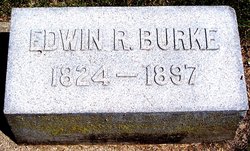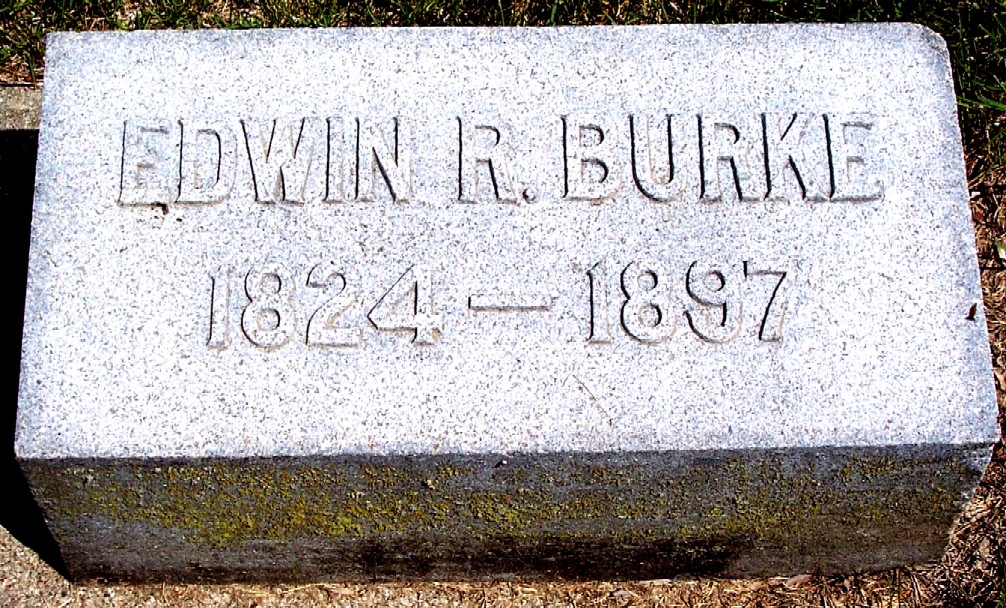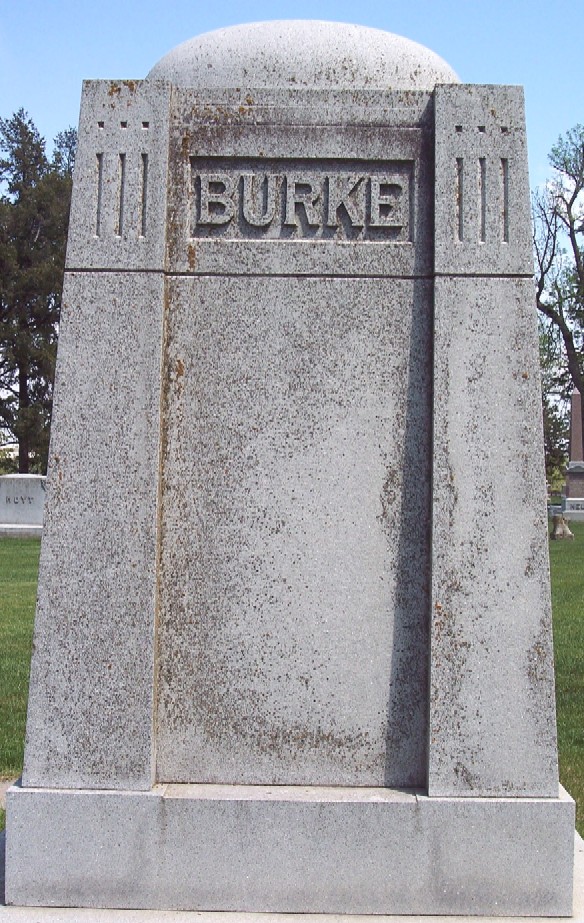Feb 4, 1897 - Carroll Sentinel - The funeral services over the remains of E.R. Burke were held this afternoon at 2 o'clock in the dining room of the hotel. This dining room had been Mr. Burke's especial pride, his home, he said, and is fitted up as are but few in the country, and it seemed peculiarly fitting that the last rites of earth for his remains should be held in this room. There was a profusion of beautiful floral offerings, testifying the love and appreciation of his worth by his friends, and a large number were present to pay their last respects to his memory.
After a short prayer and the singing of that beautiful hymn, "Last Hope." by the quartet, Rev. Ernst gave a short sketch of the life of the deceased, the sterling worth of whose character gave a splendid opportunity to impress upon his hearers the necessity and advantage to the individual of cultivating character, without which the best education and highest purpose is vain. The speaker summed up Mr. Burke's character as follows:
"He was patient without being pusillanimous, proud without being obtrusive, full of wit and humor, well informed on all subjects, not easily deceived, shrewd but scrupulous, beloved in his own circle, honored by his fellow citizens, a man of affairs, though a student, a gentleman, and a scholar, a man given to hospitality, broad minded, sincere, worthy of respect and confidence."
The quartet, composed of Misses Bangs and Lynch and Messrs. Wilhite and Dunphy, then rendered in sweet harmony the anthem, "Abide With Me." A large number of friends followed the remains to the cemetery, where a short service was held before consigning them to their lasting place. The pallbearers were W.L. Culbertson, H.W. Macomber, N Beiter, T.G. Paine, J.C. Letts, W.A. McLagan.
The news of the death of Mr. Burke was not a surprise, for he has been in poor health for a number of years, and for the past few weeks but little hope has been entertained of his recovery. About a week prior to his death the disease took a sudden turn for the worse and his son Walter, of Minneapolis, and his sister, Mrs. C.F Emery, of Chicago, Illinois, were summoned. Sunday he was thought to be improving and his son returned home, he had scarcely arrived there when he received a telegram announcing that sad news.
For several years it had been Mr. Burke's practice to spend the winters in a milder climate, in company with his wife. The winter of 1888-89 was spent in Europe, and he found relief from his sufferings and returned in better health than he had been for some years. He was afflicted with bronchial trouble and the cold climate of this latitude in winter was too severe for him and never failed to aggravate his affliction. He had intended to spend this winter at San Diego, CA as that climate appeared to be well suited to him but just as he was almost completing his arrangements to depart he was taken sick.
During his last illness, which extended over the greater part of a month, he was confined to his room and was, during the greater part of the time, considered in a critical condition. Pneumonia set in and from that time on it was a life and death struggle. He naturaly had a splendid constitution and an indominatable will or the end would have come much sooner than it did. He remained in possesion of his faculties until the last and spoke cheering words of comfort to those around him who were watching the life of a perfect type of manhood ebbing away. Death when it drew its drapery around its victim did so quietly and gently that one could scarcely realize that with him lifes great battle was ended. The man with such a iron will, with such a type of physical manhood, who had stood the storms of seventy-three years, was now at rest.
The subject of this sketch was born in Ohio, April 24, 1824. There he was educated and started in business in Chicago, where he made his home for twenty-five years. He engaged in the grain commission business and was a member of the board of trade. Much of his time for a number of years was spent on the road in connection with his commission house.
In 1876 he and his family moved to this city and engaged in the hotel business, which they have continued ever since. Mr. Burke, as well as his wife, proved to be admirably equipped for this and their success was assured from the start. After the fire, which occured in 1879, he erected a new hotel north of the square, which soon became one of the most popular resorts for the traveling public to be found in his part of the state. So well did the business pay and so popular had 'Burke's hotel" become, that in 1891 the splendid new addition was added.
This was an undertaking that but few men would try in a city of this size, but under the management of Mr. and Mrs. Burke it has proven a success. Today Burke's hotel is more popular than ever and it has become a general "Mecca," where the traveling public and better accommodations than at my other point in the state.
Mr. Burke was a man of strong individuality and would not fail to leave an impression on all with whom he came in contact. His outward appearance, while naturally brusque and decisive, was characteristic of the man. Beneath that exterior beat a heart as true as steel and ever in sympathy with the teachings of a noble and upright man. His mind was not one stored with the things of life or the rounds of every day gossip. He was a faithful student of the best writers and was as familiar with those who have made their mark in science, literature and art, as a student is with his classmates.
In order to know the full scope and breadth of his mind it was necessary to be acquainted with him, for he was not of the school of thinkers who air their knowledge on the street corners. In the death of Colonel Burke, as he was known, the city loses a good citizen and one who has done more to bring it prominently before the public than any other citizen who has resided here. Mr. Burke and his hotel are known far and wide, and all who have partaken of their hospitality could not but carry a favorable opinion of our city with them. His death is in the nature of a public loss and we all join in sympathy with the sorrowing relatives who today are bowed down will grief.
Feb 4, 1897 - Carroll Sentinel - The funeral services over the remains of E.R. Burke were held this afternoon at 2 o'clock in the dining room of the hotel. This dining room had been Mr. Burke's especial pride, his home, he said, and is fitted up as are but few in the country, and it seemed peculiarly fitting that the last rites of earth for his remains should be held in this room. There was a profusion of beautiful floral offerings, testifying the love and appreciation of his worth by his friends, and a large number were present to pay their last respects to his memory.
After a short prayer and the singing of that beautiful hymn, "Last Hope." by the quartet, Rev. Ernst gave a short sketch of the life of the deceased, the sterling worth of whose character gave a splendid opportunity to impress upon his hearers the necessity and advantage to the individual of cultivating character, without which the best education and highest purpose is vain. The speaker summed up Mr. Burke's character as follows:
"He was patient without being pusillanimous, proud without being obtrusive, full of wit and humor, well informed on all subjects, not easily deceived, shrewd but scrupulous, beloved in his own circle, honored by his fellow citizens, a man of affairs, though a student, a gentleman, and a scholar, a man given to hospitality, broad minded, sincere, worthy of respect and confidence."
The quartet, composed of Misses Bangs and Lynch and Messrs. Wilhite and Dunphy, then rendered in sweet harmony the anthem, "Abide With Me." A large number of friends followed the remains to the cemetery, where a short service was held before consigning them to their lasting place. The pallbearers were W.L. Culbertson, H.W. Macomber, N Beiter, T.G. Paine, J.C. Letts, W.A. McLagan.
The news of the death of Mr. Burke was not a surprise, for he has been in poor health for a number of years, and for the past few weeks but little hope has been entertained of his recovery. About a week prior to his death the disease took a sudden turn for the worse and his son Walter, of Minneapolis, and his sister, Mrs. C.F Emery, of Chicago, Illinois, were summoned. Sunday he was thought to be improving and his son returned home, he had scarcely arrived there when he received a telegram announcing that sad news.
For several years it had been Mr. Burke's practice to spend the winters in a milder climate, in company with his wife. The winter of 1888-89 was spent in Europe, and he found relief from his sufferings and returned in better health than he had been for some years. He was afflicted with bronchial trouble and the cold climate of this latitude in winter was too severe for him and never failed to aggravate his affliction. He had intended to spend this winter at San Diego, CA as that climate appeared to be well suited to him but just as he was almost completing his arrangements to depart he was taken sick.
During his last illness, which extended over the greater part of a month, he was confined to his room and was, during the greater part of the time, considered in a critical condition. Pneumonia set in and from that time on it was a life and death struggle. He naturaly had a splendid constitution and an indominatable will or the end would have come much sooner than it did. He remained in possesion of his faculties until the last and spoke cheering words of comfort to those around him who were watching the life of a perfect type of manhood ebbing away. Death when it drew its drapery around its victim did so quietly and gently that one could scarcely realize that with him lifes great battle was ended. The man with such a iron will, with such a type of physical manhood, who had stood the storms of seventy-three years, was now at rest.
The subject of this sketch was born in Ohio, April 24, 1824. There he was educated and started in business in Chicago, where he made his home for twenty-five years. He engaged in the grain commission business and was a member of the board of trade. Much of his time for a number of years was spent on the road in connection with his commission house.
In 1876 he and his family moved to this city and engaged in the hotel business, which they have continued ever since. Mr. Burke, as well as his wife, proved to be admirably equipped for this and their success was assured from the start. After the fire, which occured in 1879, he erected a new hotel north of the square, which soon became one of the most popular resorts for the traveling public to be found in his part of the state. So well did the business pay and so popular had 'Burke's hotel" become, that in 1891 the splendid new addition was added.
This was an undertaking that but few men would try in a city of this size, but under the management of Mr. and Mrs. Burke it has proven a success. Today Burke's hotel is more popular than ever and it has become a general "Mecca," where the traveling public and better accommodations than at my other point in the state.
Mr. Burke was a man of strong individuality and would not fail to leave an impression on all with whom he came in contact. His outward appearance, while naturally brusque and decisive, was characteristic of the man. Beneath that exterior beat a heart as true as steel and ever in sympathy with the teachings of a noble and upright man. His mind was not one stored with the things of life or the rounds of every day gossip. He was a faithful student of the best writers and was as familiar with those who have made their mark in science, literature and art, as a student is with his classmates.
In order to know the full scope and breadth of his mind it was necessary to be acquainted with him, for he was not of the school of thinkers who air their knowledge on the street corners. In the death of Colonel Burke, as he was known, the city loses a good citizen and one who has done more to bring it prominently before the public than any other citizen who has resided here. Mr. Burke and his hotel are known far and wide, and all who have partaken of their hospitality could not but carry a favorable opinion of our city with them. His death is in the nature of a public loss and we all join in sympathy with the sorrowing relatives who today are bowed down will grief.
Family Members
Advertisement
Records on Ancestry
Advertisement













